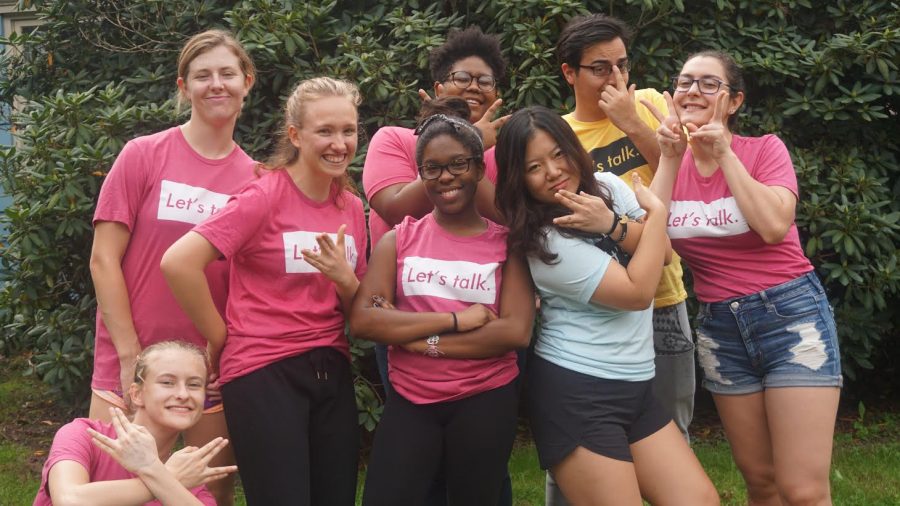The 10th annual Common Ground retreat
October 19, 2018
Fostering a community
During Fall Break, around 30 students traveled to Cowan, also known as The Forrest D. Brown Conference Center, an impressive name for a large house in the woods near the CLIMBucknell challenge course. At Cowan, students participated in the 10th annual Common Ground retreat, a student-led program that participants regard as being life-changing.
Over the course of the five-day program students discussed issues of race, ethnicity, gender inequality, sexual orientation, gender identity, mental health, ability status, socioeconomic status, and religion. The experience presents a balance of informative and engaging exercises with light and fun activities. To accomplish this balance, the directors and facilitators alternated between meaningful discussion and interactive activities that allowed students to reach a deeper level of understanding about the issues of identity.
Adam Workineh ’19 described the kind of discussion-filled platform that Common Ground is able to create. “Common Ground is an eye-opening experience. The conversation and discussion pulls you out of your default setting and causes you to think critically about the important issues and culture on campus,” Workineh said.
The retreat creates an inclusive, supportive, and warm community for its participants. After going through an emotional and impactful experience together, many feel excitement when they see other participants, facilitators, and directors around the University’s campus.
One of this year’s directors, Anushikha Sharma ’19 commented on the special dynamic of Common Ground as opposed to other programs related to discussions around identity. “It is always incredible to see dialogue between people who wouldn’t normally cross paths on Bucknell’s campus. When conversations on class and religion bleed in from activities into meal times, I feel like I have done my job well. Common Ground as a program is imperative because it allows a space for giving and receiving that doesn’t exist anywhere else,” Sharma said.
An impactful activity
One of the most impactful activities of the retreat is called “Magnets.” The activity provides a comprehensive illustration of the type of community and conversation Common Ground facilitated. During “Magnets,” someone offers a statement that applies to them, for example, “I don’t like walking alone at night,” and everyone else arranges themselves around that person. The distance between each participant and the person speaking represents how much each participant feels that statement applied to him or her. The activity creates a visual representation of solidarity that surrounds the person who shared. The speaker would literally end up surrounded by people who understood how they felt. Activities like this lead to an amazing feeling of connection, and many participants leave Common Ground feeling a sense of community and company in the face of some of life’s toughest experiences.
Its legacy at the University
This year’s 10th annual Common Ground retreat had the privilege of hosting its founders, Scott Teagarden ’10 and Mahdi Woodard ’09. When the pair launched the first Common Ground retreat in 2008, they had specific goals in mind. A University news story published on Sept. 12, 2008 announced the first-ever Common Ground Retreat, stating, “The main point of the retreat is for students to engage in constructive dialogue about sensitive issues and, more importantly, ‘to relate it all to Bucknell,’” Woodard said as quoted in the article.
At the first retreat, they “[devoted] one day each to the topics of race, gender and sexual orientation.” While the founders were at the Common Ground retreat this year, they discussed how the topics addressed during the retreat had grown from the original three (race, gender and sexual orientation) to nine (race, ethnicity, gender inequality, sexual orientation, gender identity, mental health, ability status, socioeconomic status and religion).
The founders also engaged in conversation about how the goals of Common Ground have and will continue to evolve in the future.
Sharma explained the importance of reevaluating the goals of Common Ground. “By gaining perspective on how and why Common Ground had started, we can better understand how it needs to adapt and change. It is important to remember that Scott and Mahdi were on campus almost 10 years ago, and with the passage of time, much remains the same, but also much has changed. There is a much stronger political divide and a segregation between ideologies that wasn’t as prominent before. Thus, while Common Ground is still successful in bringing different voices together, we must also focus on reevaluating our mission and vision for the next 10 years,” Sharma said.
Common Ground is as important now as ever before, and is a retreat that will continue to address the most pressing issues on our campus for many years to come.






















